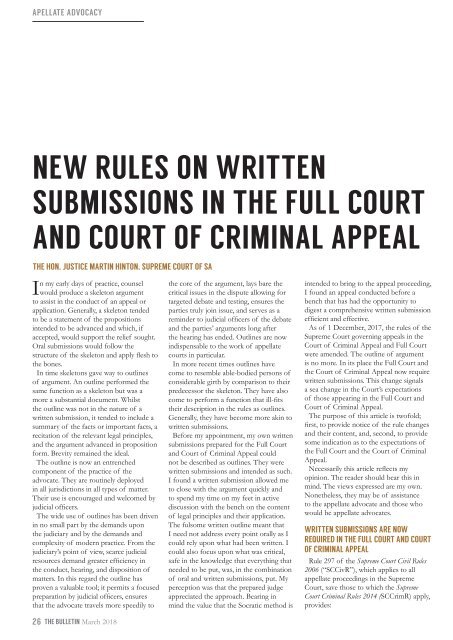LSB March 2018_Web
You also want an ePaper? Increase the reach of your titles
YUMPU automatically turns print PDFs into web optimized ePapers that Google loves.
APELLATE ADVOCACY<br />
NEW RULES ON WRITTEN<br />
SUBMISSIONS IN THE FULL COURT<br />
AND COURT OF CRIMINAL APPEAL<br />
THE HON. JUSTICE MARTIN HINTON, SUPREME COURT OF SA<br />
In my early days of practice, counsel the core of the argument, lays bare the<br />
would produce a skeleton argument critical issues in the dispute allowing for<br />
to assist in the conduct of an appeal or targeted debate and testing, ensures the<br />
application. Generally, a skeleton tended parties truly join issue, and serves as a<br />
to be a statement of the propositions reminder to judicial officers of the debate<br />
intended to be advanced and which, if and the parties’ arguments long after<br />
accepted, would support the relief sought. the hearing has ended. Outlines are now<br />
Oral submissions would follow the indispensable to the work of appellate<br />
structure of the skeleton and apply flesh to courts in particular.<br />
the bones.<br />
In more recent times outlines have<br />
In time skeletons gave way to outlines come to resemble able-bodied persons of<br />
of argument. An outline performed the considerable girth by comparison to their<br />
same function as a skeleton but was a predecessor the skeleton. They have also<br />
more a substantial document. Whilst come to perform a function that ill-fits<br />
the outline was not in the nature of a their description in the rules as outlines.<br />
written submission, it tended to include a Generally, they have become more akin to<br />
summary of the facts or important facts, a written submissions.<br />
recitation of the relevant legal principles, Before my appointment, my own written<br />
and the argument advanced in proposition submissions prepared for the Full Court<br />
form. Brevity remained the ideal.<br />
and Court of Criminal Appeal could<br />
The outline is now an entrenched not be described as outlines. They were<br />
component of the practice of the written submissions and intended as such.<br />
advocate. They are routinely deployed I found a written submission allowed me<br />
in all jurisdictions in all types of matter. to close with the argument quickly and<br />
Their use is encouraged and welcomed by to spend my time on my feet in active<br />
judicial officers.<br />
discussion with the bench on the content<br />
The wide use of outlines has been driven of legal principles and their application.<br />
in no small part by the demands upon The fulsome written outline meant that<br />
the judiciary and by the demands and I need not address every point orally as I<br />
complexity of modern practice. From the could rely upon what had been written. I<br />
judiciary’s point of view, scarce judicial could also focus upon what was critical,<br />
resources demand greater efficiency in safe in the knowledge that everything that<br />
the conduct, hearing, and disposition of needed to be put, was, in the combination<br />
matters. In this regard the outline has of oral and written submissions, put. My<br />
proven a valuable tool; it permits a focused perception was that the prepared judge<br />
preparation by judicial officers, ensures appreciated the approach. Bearing in<br />
that the advocate travels more speedily to mind the value that the Socratic method is<br />
intended to bring to the appeal proceeding,<br />
I found an appeal conducted before a<br />
bench that has had the opportunity to<br />
digest a comprehensive written submission<br />
efficient and effective.<br />
As of 1 December, 2017, the rules of the<br />
Supreme Court governing appeals in the<br />
Court of Criminal Appeal and Full Court<br />
were amended. The outline of argument<br />
is no more. In its place the Full Court and<br />
the Court of Criminal Appeal now require<br />
written submissions. This change signals<br />
a sea change in the Court’s expectations<br />
of those appearing in the Full Court and<br />
Court of Criminal Appeal.<br />
The purpose of this article is twofold;<br />
first, to provide notice of the rule changes<br />
and their content, and, second, to provide<br />
some indication as to the expectations of<br />
the Full Court and the Court of Criminal<br />
Appeal.<br />
Necessarily this article reflects my<br />
opinion. The reader should bear this in<br />
mind. The views expressed are my own.<br />
Nonetheless, they may be of assistance<br />
to the appellate advocate and those who<br />
would be appellate advocates.<br />
WRITTEN SUBMISSIONS ARE NOW<br />
REQUIRED IN THE FULL COURT AND COURT<br />
OF CRIMINAL APPEAL<br />
Rule 297 of the Supreme Court Civil Rules<br />
2006 (“SCCivR”), which applies to all<br />
appellate proceedings in the Supreme<br />
Court, save those to which the Supreme<br />
Court Criminal Rules 2014 (SCCrimR) apply,<br />
provides:<br />
26 THE BULLETIN <strong>March</strong> <strong>2018</strong>


















